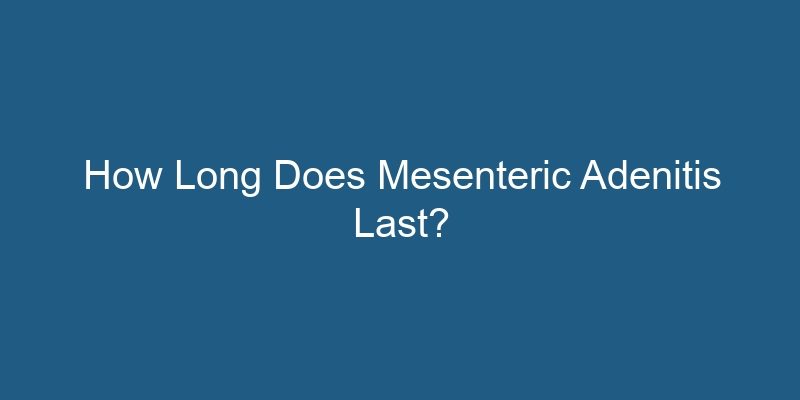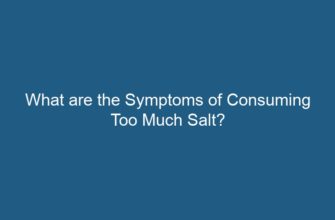Mesenteric adenitis, also known as mesenteric lymphadenitis, is a condition characterized by inflammation of the lymph nodes in the mesentery, which is the tissue that connects the intestines to the abdominal wall. This condition commonly occurs in children and young adults and is often mistaken for appendicitis due to similar symptoms.
- 1. What is Mesenteric Adenitis?
- 1.1 Causes of Mesenteric Adenitis
- 1.1.1 Viral Infections
- 1.1.2 Bacterial Infections
- 1.1.3 Other Causes
- 2. Symptoms of Mesenteric Adenitis
- 2.1 Distinguishing Mesenteric Adenitis from Appendicitis
- Mesenteric lymphadenitis in child less than 10 years: Causes, Diet|Stomach Pain-Dr. Nanda Rajneesh
- 3. Duration of Mesenteric Adenitis
- 3.1 Acute Mesenteric Adenitis
- 3.2 Recurrent Mesenteric Adenitis
- 4. Treatment of Mesenteric Adenitis
- 4.1 Symptom Management
- 4.2 Treatment for Underlying Infections
- 5. FAQs
- FAQ 1: Can mesenteric adenitis be prevented?
- FAQ 2: Can mesenteric adenitis lead to complications?
- FAQ 3: Is surgery required for mesenteric adenitis?
- FAQ 4: Can mesenteric adenitis occur in adults?
- FAQ 5: Can mesenteric adenitis recur?
- FAQ 6: Can mesenteric adenitis be diagnosed through blood tests?
- FAQ 7: Can mesenteric adenitis cause infertility?
- FAQ 8: Can mesenteric adenitis be mistaken for appendicitis in adults?
- FAQ 9: Can mesenteric adenitis cause weight loss?
- FAQ 10: Can mesenteric adenitis be chronic?
- 6. Conclusion
1. What is Mesenteric Adenitis?
Mesenteric adenitis is an inflammatory response that occurs when the lymph nodes in the mesentery become enlarged and tender. It is usually caused by an infection, most commonly a viral or bacterial infection, such as a respiratory or gastrointestinal infection. The swelling of the lymph nodes can lead to abdominal pain, fever, and other symptoms.
1.1 Causes of Mesenteric Adenitis
The most common cause of mesenteric adenitis is an infection, specifically viral or bacterial. Viral infections that can lead to mesenteric adenitis include adenovirus, Epstein-Barr virus, and cytomegalovirus. Bacterial infections that can cause this condition include Yersinia enterocolitica, Salmonella, and Campylobacter. In some cases, mesenteric adenitis can also occur as a result of inflammatory bowel disease or autoimmune disorders.
1.1.1 Viral Infections
Viral infections are a common cause of mesenteric adenitis, especially in children and young adults. Adenovirus, Epstein-Barr virus, and cytomegalovirus are among the viruses known to cause this condition. These viruses can be transmitted through respiratory droplets or contaminated food and water. The infection leads to an immune response, causing the lymph nodes in the mesentery to become inflamed and swollen.
1.1.2 Bacterial Infections
Bacterial infections can also trigger mesenteric adenitis. Yersinia enterocolitica, Salmonella, and Campylobacter are examples of bacteria that can cause this condition. These bacteria are often associated with gastrointestinal infections, such as food poisoning. The bacteria invade the intestines, leading to an immune response and inflammation of the lymph nodes in the mesentery.
1.1.3 Other Causes
In addition to infections, mesenteric adenitis can occur due to other causes. Inflammatory bowel disease, such as Crohn’s disease or ulcerative colitis, can lead to inflammation of the mesenteric lymph nodes. Autoimmune disorders, such as lupus or rheumatoid arthritis, can also cause mesenteric adenitis as a result of the immune system attacking healthy tissues.
2. Symptoms of Mesenteric Adenitis
The symptoms of mesenteric adenitis can vary depending on the underlying cause and the individual. However, common symptoms include:
- Abdominal pain or discomfort, usually located in the lower right abdomen
- Swollen and tender lymph nodes in the abdomen
- Fever
- Nausea and vomiting
- Loss of appetite
- Fatigue or malaise
The severity of symptoms can range from mild to severe, and they may last for several days to a few weeks. It is important to consult a healthcare professional for an accurate diagnosis and appropriate treatment.
2.1 Distinguishing Mesenteric Adenitis from Appendicitis
Mesenteric adenitis is often mistaken for appendicitis due to similar symptoms, particularly abdominal pain in the lower right quadrant. However, there are some key differences that can help distinguish between the two conditions. Unlike appendicitis, mesenteric adenitis does not typically cause a significant increase in white blood cell count or severe localized tenderness in the right lower abdomen. Additionally, mesenteric adenitis is more common in children and young adults, while appendicitis can occur at any age.
Mesenteric lymphadenitis in child less than 10 years: Causes, Diet|Stomach Pain-Dr. Nanda Rajneesh
3. Duration of Mesenteric Adenitis
The duration of mesenteric adenitis can vary depending on several factors, including the underlying cause, the individual’s immune response, and the effectiveness of treatment. In general, mesenteric adenitis is a self-limiting condition, meaning it tends to resolve on its own without specific treatment.
3.1 Acute Mesenteric Adenitis
Acute mesenteric adenitis refers to the sudden onset of symptoms and inflammation of the mesenteric lymph nodes. This form of mesenteric adenitis usually lasts for a few days to a couple of weeks. The symptoms may gradually improve during this time, and the swelling of the lymph nodes may begin to recede. The duration of acute mesenteric adenitis can be influenced by various factors, such as the severity of the infection and the individual’s immune response.
3.2 Recurrent Mesenteric Adenitis
In some cases, mesenteric adenitis can recur or persist over a longer period. Recurrent mesenteric adenitis refers to multiple episodes of inflammation and swelling of the mesenteric lymph nodes. The duration of recurrent mesenteric adenitis can vary greatly, with some individuals experiencing episodes that last a few days, while others may have symptoms for several weeks or months. The frequency and duration of recurrent episodes can be influenced by factors such as the underlying cause, immune system function, and overall health status.
4. Treatment of Mesenteric Adenitis
In most cases, mesenteric adenitis does not require specific treatment and resolves on its own. However, certain measures can help alleviate symptoms and promote recovery. The treatment approach may vary depending on the underlying cause and the severity of symptoms.
4.1 Symptom Management
Managing symptoms is an essential aspect of mesenteric adenitis treatment. This may include:
- Taking over-the-counter pain relievers, such as acetaminophen or ibuprofen, to alleviate abdominal pain and reduce fever
- Getting plenty of rest and avoiding strenuous activities
- Drinking fluids to stay hydrated
- Eating a balanced diet to support the immune system
- Applying a warm compress to the abdomen to help relieve discomfort
- Following any additional recommendations provided by a healthcare professional
4.2 Treatment for Underlying Infections
If the mesenteric adenitis is caused by a bacterial infection, antibiotics may be prescribed to treat the underlying infection. It is important to finish the full course of antibiotics as prescribed by a healthcare professional to ensure the infection is fully treated. However, if the condition is caused by a viral infection, antibiotics will not be effective, as they only target bacterial infections. In such cases, symptom management and supportive care are typically recommended.
5. FAQs
FAQ 1: Can mesenteric adenitis be prevented?
Mesenteric adenitis is often a result of viral or bacterial infections, which can be challenging to prevent entirely. However, practicing good hygiene, such as washing hands regularly, avoiding close contact with individuals who are sick, and ensuring food safety, can help reduce the risk of infections that can lead to mesenteric adenitis.
FAQ 2: Can mesenteric adenitis lead to complications?
In most cases, mesenteric adenitis resolves without complications. However, complications can occur if the underlying infection spreads or if the lymph nodes become abscessed. It is essential to seek medical attention if symptoms worsen or persist.
FAQ 3: Is surgery required for mesenteric adenitis?
Surgery is generally not necessary for mesenteric adenitis. However, if the symptoms are severe or if there is uncertainty about the diagnosis, a healthcare professional may recommend further imaging tests or even surgical exploration to rule out other conditions.
FAQ 4: Can mesenteric adenitis occur in adults?
While mesenteric adenitis is more commonly seen in children and young adults, it can occur in individuals of any age group. However, the incidence is relatively lower in adults compared to children.
FAQ 5: Can mesenteric adenitis recur?
Yes, mesenteric adenitis can recur or persist over a longer period. Recurrent episodes of inflammation and lymph node swelling can occur due to various factors, including underlying infections or autoimmune disorders.
FAQ 6: Can mesenteric adenitis be diagnosed through blood tests?
Blood tests can be helpful in diagnosing mesenteric adenitis by assessing the levels of white blood cells and inflammatory markers. However, blood tests alone are not sufficient for a definitive diagnosis, and further imaging tests, such as ultrasound or CT scan, may be required to confirm the condition.
FAQ 7: Can mesenteric adenitis cause infertility?
No, mesenteric adenitis does not directly cause infertility. However, certain underlying conditions or infections that can lead to mesenteric adenitis, such as pelvic inflammatory disease, may have implications for fertility. It is important to seek appropriate medical care for any concerns regarding fertility.
FAQ 8: Can mesenteric adenitis be mistaken for appendicitis in adults?
While mesenteric adenitis is more commonly mistaken for appendicitis in children and young adults, it can also be misdiagnosed in adults. The similarity in symptoms, such as abdominal pain, can lead to confusion. A thorough evaluation by a healthcare professional is necessary to differentiate between the two conditions.
FAQ 9: Can mesenteric adenitis cause weight loss?
Weight loss is not typically associated with mesenteric adenitis. However, if the underlying infection or condition causing mesenteric adenitis leads to prolonged loss of appetite or significant gastrointestinal symptoms, weight loss may occur as a secondary effect.
FAQ 10: Can mesenteric adenitis be chronic?
While mesenteric adenitis is commonly self-limiting, it can sometimes persist or recur over a longer period, resulting in a chronic condition. The duration and frequency of episodes can vary depending on the underlying cause and individual factors.
6. Conclusion
Mesenteric adenitis is an inflammatory condition characterized by the swelling of lymph nodes in the mesentery. It is commonly caused by viral or bacterial infections and can lead to symptoms such as abdominal pain, fever, and fatigue. The duration of mesenteric adenitis can vary, with acute episodes lasting a few days to a couple of weeks and recurrent cases lasting for longer periods. Treatment focuses on symptom management and addressing the underlying infection, if applicable. It is important to consult a healthcare professional for an accurate diagnosis and appropriate care.










